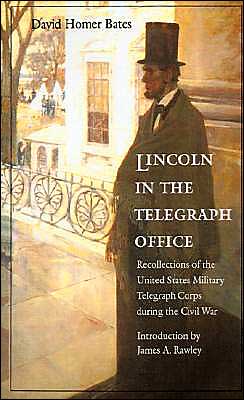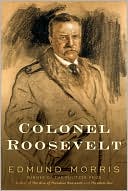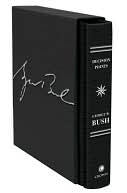Lincoln in the Telegraph Office: Recolections of the United States Military Telegraph Corps during the Civil War
As the Civil War raged, President Abraham Lincoln spent many hours in the War Department’s telegraph office, where he received all his telegrams. Morning, noon, and night Lincoln would visit the small office to receive the latest news from the armies at the front. The place was a refuge for the president, who waited for incoming dispatches and talked while they were being deciphered. David Homer Bates, one of the first military telegraphers, recollects those presidential visits during...
Search in google:
As the Civil War raged, President Abraham Lincoln spent many hours in the War Department’s telegraph office, where he received all his telegrams. Morning, noon, and night Lincoln would visit the small office to receive the latest news from the armies at the front. The place was a refuge for the president, who waited for incoming dispatches and talked while they were being deciphered. David Homer Bates, one of the first military telegraphers, recollects those presidential visits during times of crisis. Lincoln in the Telegraph Office, originally published in 1907, shows history in the making and personalities at their most unguarded: Lincoln, Secretary of War Edwin Stanton, Andrew Carnegie, General George McClellan, and many others. The reader is with Lincoln at the scene of dramatic tidings: of the Northern disasters at Bull Run, of Meade’s victory at Gettysburg, of Grant’s capture of Richmond. Lincoln wrote the first draft of the Emancipation Proclamation at the telegraph office, and from there the news of his assassination was relayed. Wartime human-interest anecdotes, the wonder of the new technology, the unraveling of ciphers and codes, conspiracies and rumors, a heightened sense of onrushing events, the tragedy of Good Friday 1865—all are conveyed in this classic of Lincolniana.
Introduction to the Bison Books EditionixIIntroduction3IIOrganization of the Military Telegraph Corps14IIIThe War Department Telegraph Office38IVCipher-Codes and Messages49VConfederate Cipher-Codes and Intercepted Despatches68VIIn the First Months of the War86VIIMcClellan's Disagreements with the Administration101VIIILincoln in Touch with Army Movements113IXEckert, Chief of the War Department Telegraph Staff124XThe First Draft of the Emancipation Proclamation138XIThe Gettysburg and Vicksburg Year154XIILincoln's Tender Treatment of Rosecrans158XIIIA Remarkable Feat in Railroad Transportation172XIVLincoln in Every-Day Humor183XVLincoln's Love for His Children208XVIA Bogus Proclamation228XVIIGrant's Wilderness Campaign244XVIIILincoln Under Fire at Fort Stevens250XIXCables and Signals257XXLincoln's Forebodings of Defeat at the Polls267XXIConspirators in Canada287XXIIThe Attempt to Burn New York299XXIIIGrant's Orders for the Removal of Thomas310XXIVThe Abortive Peace Conference at Hampton Roads322XXVLincoln's Last Days343XXVIThe Assassination364XXVIIPayne, the Assassin377XXVIIILincoln's Manner Contrasted with Stanton's389Appendix411Index427








